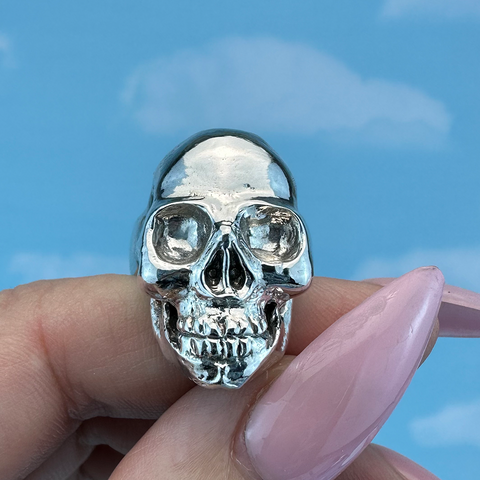Skulls – they're often perceived as symbols of darkness, mystery, and all things witchy. But as an artist, I see the human skull differently. To me, it represents a kind of magic – a canvas of intricacy, beauty, and the astonishing work of nature. It is a symbol of the human anatomy's profound beauty, reflecting a complex creation where every element of our bodies is designed to perfection.
Let's look into various cultures around the world, they carry deeper meanings that reflect a positive outlook on life, the cycle of existence, and even rebirth. This article delves into the diverse cultural interpretations of skulls and explores how they can be seen as symbols of both the end and the beginning.
In Aztec culture, the skull was a prominent symbol, often associated with death and sacrifice. The Aztecs believed in the cyclical nature of life, where death was not the end but a transition to a new beginning. They celebrated Dia de los Muertos, or the Day of the Dead, a vibrant festival where they honored their deceased loved ones. The skull, or "calavera," was a joyful and colorful representation, reminding them of the continuation of life beyond the physical realm. It symbolized a positive connection between the living and the departed, emphasizing the beauty in life's cycle.
In Tibetan Buddhism, the skull serves as a powerful reminder of the impermanence of life. The Kapala, a cup made from a human skull, is used in rituals and ceremonies. It signifies the transitory nature of existence and encourages practitioners to embrace life fully, knowing that it will ultimately lead to a new beginning. The skull becomes a symbol of letting go of attachments and embracing the spiritual journey, encouraging a positive outlook towards enlightenment.
The Mexican tradition of sugar skulls during Dia de los Muertos illustrates a beautiful fusion of life and death symbolism. These elaborately decorated, colorful skulls celebrate the lives of those who have passed away, allowing their memory to live on in a positive and joyful way. Families come together to create sugar skulls as a tribute to their loved ones, emphasizing the importance of cherishing the present and honoring the past simultaneously.
In Hinduism, Lord Shiva is often depicted wearing a garland of skulls. These skulls represent the destruction of the ego and attachment, as Shiva is the god of both destruction and creation. This duality signifies that the end of one phase of life is essential for the beginning of another. The skull becomes a symbol of transformation, shedding the old to make way for the new, fostering a positive outlook on the cyclical nature of existence.
Skulls, often associated with death, take on profound positive meanings in various cultures around the world. From the Aztecs to Tibetan Buddhists, Mexican traditions to Hinduism, the skull symbolizes the end of one phase and the beginning of another. It reminds us of the beauty in life's cyclical nature, encouraging us to cherish the present, let go of attachments, and embrace transformation. In these cultural interpretations, skulls are a powerful reminder that in every end, there is a new beginning, and in every death, there is life. They teach us to find hope, beauty, and positivity in the most unexpected places, even in symbols that seem to represent the finality of life.
Hand carved, Sterling Silver Unisex Skull Ring Click Here to order.

